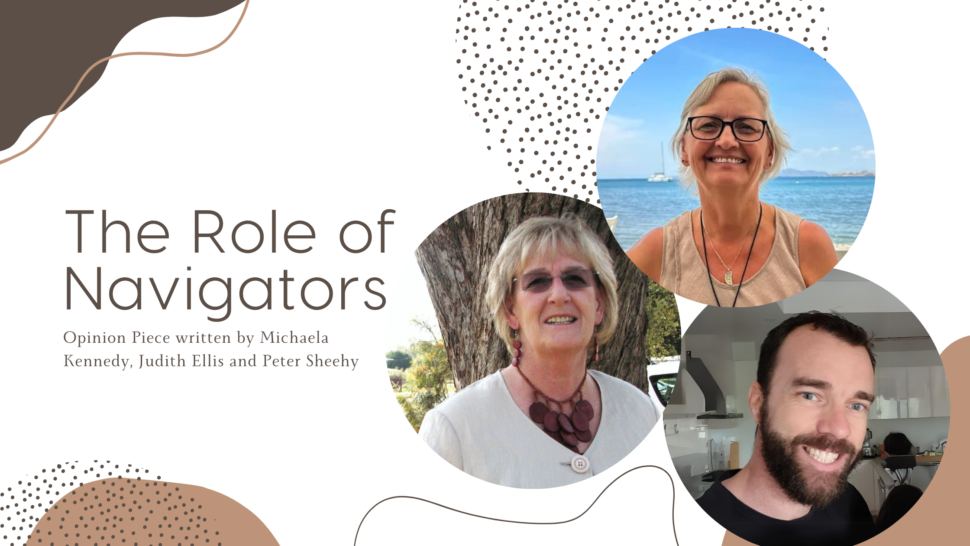The Role of Navigators – An Opinion Piece by Michaela Kennedy, Judith Ellis and Peter Sheehy

Michaela Kennedy, Judith Ellis and Peter Sheehy have co-written this opinion piece about the part of the recent Review that relates particularly to the recommended introduction of navigators. Michaela is an independent support coordinator, Judith is a parent of a man with very high and complex support needs who self-manages her son’s funding, and Peter is a disability rights supporter and has a sister with Down syndrome.
Since the NDIS Review Report was made public in December ‘23, much of the disability community’s attention and concern has rightly been focussed on the key elements of choice and control and maintaining the independence of support. There are also serious concerns about what looks like a merger of outdated services, and about the unproven concept that safety from harm, neglect and abuse can only be achieved by a bureaucratic registration system. We share and support these concerns and, at the same time, turned our attention to the Review’s commentary on “navigators”.
While it was somewhat relieving to see the Review Group’s statement that:
“All people with disability should have access to a Navigator, who acts as their agent.
Navigators should act on behalf of the person with disability, at their direction, and be incentivised to build capability, help the person meet their goals, facilitate choice and enable inclusion.”
(page 101 of Final Report)
Our concerns and questions ranged from “what fundamental safeguards would be mandatory?”, “what is the cost – who are the winners and losers?”, “how will established relationships be maintained?” to “do all people with disability need/want access to a ‘navigator’?” and “is there a parallel course of action rather than such a wholesale and costly change?”.
We hold serious concerns about Governments’ willingness to implement the safeguards and principles we have set out below. Co-design, commitment, policy and adequate funding by the Government are all needed if a new role of navigator is to make a real difference in people’s lives.
This led us to the following:
To give people real control and independence, navigators must:
- be separate to Government and to disability service providers
- not end up as a referral agency to the existing disability service industry, and with unmanageable ‘caseloads’, which has simply not worked.
- have values, expertise, and time to assist people with disability and families to achieve a fully inclusive life where they can exercise control and autonomy
- be located where they can be more easily found and within mainstream society.
Independence from Government and service providers:
Any transition from the current model to a new one cannot simply mirror the past, in which many Support Co-ordinators and Local Area Coordinators are outsourced to the disability service sector, who currently offer multiple types of services and supports to participants. It is simply impossible for them to “act on behalf of the person with disability, at their discretion…. facilitate choice and enable inclusion” when there are such obvious and overwhelming conflicts of interest.
Navigators having unmanageable caseloads and becoming a referral agency to existing services:
The Review Group’s view was that:
“People with disability….be incentivised to build capability, help the person meet their goals, facilitate choice and enable inclusion.” (page 101 of Final Report)
This requires the navigators to have a lot of time and engagement to know the individual, their support networks, and the local community to assist in a ‘whole-of-person’ way, and help individuals and families to pursue an inclusive life. This will not happen if there isn’t enough funding and inflexibility.
Values and expertise of navigators
How will navigators be recruited? Will they receive training and development relevant to the values inherent in the role thought up by the Review Group? How will they be supported to assist individuals “meet their goals, facilitate choice and enable inclusion”?
For the vision of the Review Group to become real, people recruited to this new role will need to hold a clear set of values and expertise. They need time to spend with individuals, families, their networks, and their communities, to help people to develop ideas about a future that reflects their individuality, identity and needs, then plan the implementation of ideas, monitor and report on progress / outcomes.
Values based training is essential.
Where will navigators be located?
The Review Group stated:
“Navigators should operate out of locally based ‘hubs’ with other relevant services and be able to share information on support quality and opportunities for greater community inclusion”.
(page 101, Final Report)
Operating locally could possibly result in navigators being more easily found. What is meant, however, by “other relevant services”? This could mean operating from an existing disability service provider or from a NDIA office. Will they then only be available during office hours because of their location? Will they only offer typical disability-specific, or community-based services?
Returning to one of our first questions “do all individuals want a navigator?” we would suggest there is a potential parallel course which involves:
- maintaining access to independent support coordinators
- investing in capacity building of individuals and families, so that they can gain and share the knowledge, skills and confidence to be their own navigators and avoid yet another way to create dependence on outside experts.
It needs a real commitment from Governments to avoid overwhelming conflicts of interest, achieve a role that is tailored to the individual and an avoidance of unmanageable caseloads with constant pressure to meet high expectations. Moving ahead needs a different approach to a widespread introduction of navigators.
We urge the Government to involve people with disability and families in a co-design process to come up with solutions to these questions before any changes are made.
Consultation is not co-design.

Join the conversation